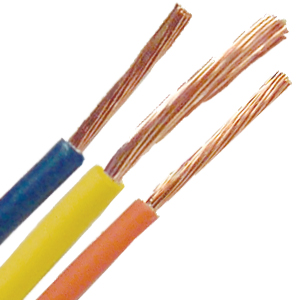What are the Differences between the Types of Primary Automotive Wires?

With all the different types of primary automotive wire, it can be hard to determine which one is the right choice for your application. You'll need to understand the environment that the wire will be used in to help you select the right type.
To understand the differences between the types, you'll need to know the difference between PVC and Cross-link automotive wire. The main difference between the two is the temperature range. Cross-link automotive wire can withstand higher temperatures and stress than PVC.
As always, if you have any additional automotive wire questions that we don't cover in this article, please contact us!
Cross-Link Automotive Wire
Cross-link automotive wire can withstand higher heat, abrasion, extra durability and aging. It’s often used in high-stress applications like race or industrial use vehicles. Cross-linked insulation is created by extruding the material through a tube, under heat and pressure, in order to "cross-link," or change the molecules of insulation to another state. Cross-link automotive wire is compatible with most automotive connectors.
Cross-link automotive primary wire is comprised of three different types of wire:
Type GXL Wire
GXL wire features a thin wall or thickness and is used mainly for trucks and trailers. GXL has a temperature range of -40°C to 125ºC. GXL has excellent heat resistance and has a smaller diameter and lighter weight than standard duty S.A.E J1128, Type SXL.
Type SXL Wire
SXL wire features a standard wall or thickness, has excellent heat and abrasion resistance, and is used for general circuit wiring. SXL has a temperature range of -40°C to 125ºC
Type TXL Wire
TXL wire features an extra thin wall or thickness, has excellent heat resistance and flexibility, is used for general circuit wiring and has a temperature range of -40°C to 125ºC. TXL thin wall feature makes it easier to pull through tight spaces.
PVC Automotive Wire
Polyvinyl Chloride (PVC) is a synthetic, thermoplastic material made by polymerizing vinyl and chloride. PVC automotive wire is typically found in under-hood or cabin applications. It has insulation that is highly durable and resistant to oil, grease, and acids, making it ideal for automotive, truck, trailer, marine, construction, and many other automotive electrical connections.
Type GPT Wire
GPT wire features a standard wall that is typically used for trailer wire and general circuit wiring and has excellent resistance to oil, flame, and abrasion. GPT has a temperature range of -40°C to 85ºC.
Type TWP Wire
TWP wire features a thin wall, lead-free, and is rated at 105ºC.
Type HDT Wire
HDT wire is a heavy-wall automotive wire and rated at 85ºC. HDT is used where greater physical protection is required and designed for surface vehicle electrical systems.
Primary Automotive Wire Overview
| Name | Type | Temperature | Use | Specifications |
|---|---|---|---|---|
| GXL | Cross-Link | -40°C to 125ºC | Thin wall. Most common. Engine compartments - higher heat. |
Chrysler Specification MS-8900 Ford Specification ESB-M1L85-B (bare copper) ESB-M1L85-A (tinned copper), S.A.E J1128 |
| SXL | Cross-Link | -40°C to 125ºC | Standard Wall. Engine compartments where higher resistance is needed. |
Chrysler Specification MS-5919 (bare copper) Ford Specification ESB-M1L85-A (bare copper) Ford Specification ESB-M1L8-A (tinned copper) |
| TXL | Cross-Link | -40°C to 125ºC | Extra Thin Wall. Smallest and Lightweight. |
MS-8288 (bare copper) Ford Specification ESB-M1L123-A (bare copper) Ford Specification ESB-M1L123-A2 (tinned copper) |
| GPT | PVC | -40°C to 85ºC | General Circuit Wiring | S.A.E J 1128 |
| TWP | PVC | -40°C to 105ºC | Thin Wall. Lightweight and Small. |
S.A.E J 1128 |
| HDT | PVC | -40°C to 85ºC | General Circuit Wire Thickest Wall. |
SAE J-1128, Ford M1L-50A, Chrysler MS-3494 |
Understanding your application, how the wire is being used, and the environment and temperature it will be used in can help you determine the appropriate automotive primary wire you'll need. If you have additional questions, feel free to contact Lapp Tannehill either by phone, email, or chat. Our knowledgeable customer service team are ready to help.
